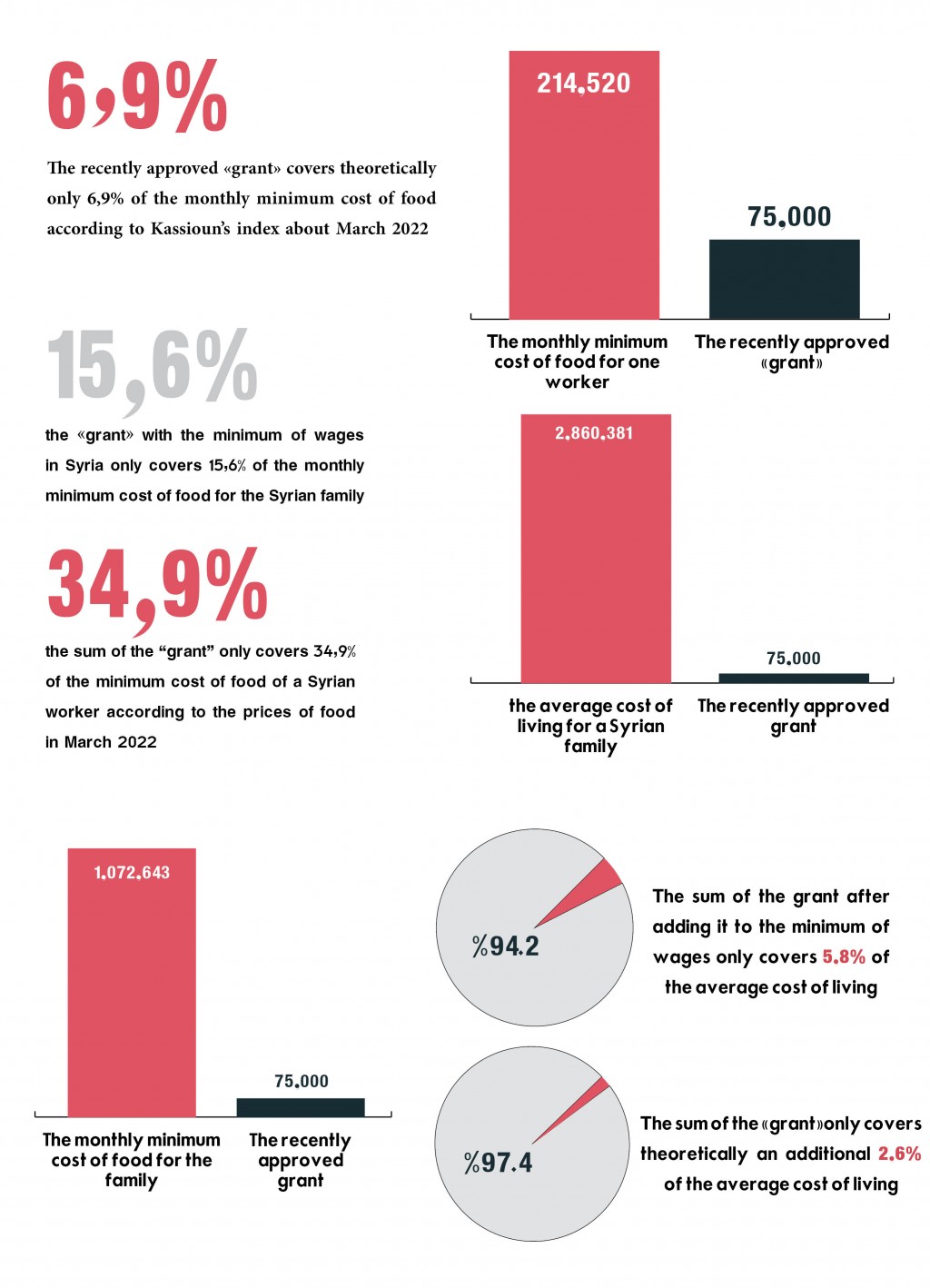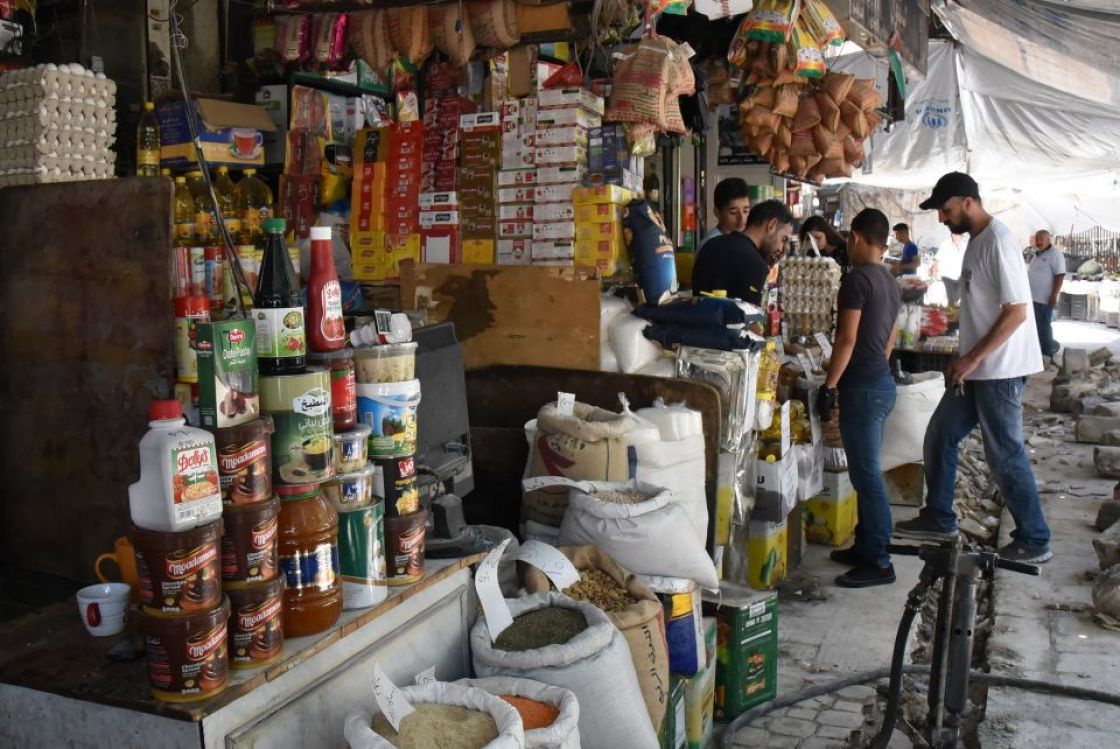- Articles
- Posted
«The Grant» Will Not Cover Anything; An Actual Increase of Wages is Required
Last Thursday, April 21, Legislative Decree No. 4 of 2022 was issued, which provides for the disbursement of what is called a «grant», with a lump sum of 75 thousand Syrian pounds for civilian and military workers, and pensioners, provided that this «grant» is disbursed only once.
As usual, as soon as the news about the «grant» were spread, it became a joke among Syrians, as they started making comparisons to show how low the sum of 75 thousand Syrians pounds was compared to the general increase in the prices of commodities in the country. So, what does this figure actually «cove»? and what is the problem behind the idea of the «grant» fundamentally?
2.6% of the Average Costs of Living
According to the data of Kassioun’s index, the average cost of living for a Syrian family of 5 has reached 2,860,381 Syrian pounds last March. Assuming that the prices in the market remained the same in the previous month, the sum of the «grant» will only cover an additional 2.6% from the average cost of living, and after adding it to the minimum of wages in the country (92,970 thousand SP) it only covers 5.8% of the average cost of living. If we assumed that two members of the family are working, what the «grant» covers after being added to the minimum of wages will remain close to tenth of the average cost of living of the family, despite that the dependency ratio under the current conditions in the country is certainly higher than that.
6.9% of the Minimum Cost of Food
Along the same line, the monthly minimum cost of food of the Syrian family has increased (according to the calculation of calories needed for survival and re-production of the workforce) during March to 1,072,643 Syrian pounds. So, if we also assumed that the prices of food have not increased during the past month, then the «grant» will only cover 6.9% of the monthly minimum cost of food for the family, and after adding it to the wage, it only increases by 15.6%. If we considered that the Syrian worker does not provide for anyone and works only to feed him/herself, then the sum of the «grant» only covers 34.9% of the minimum costs of his/her food only (214,520 Syrian pounds)!
Fanning the Flames of the Market
All that we have mentioned before is for the sake of comparison only, and does not completely reflect the reality of the situation. In fact, the «grant» does not cover anything, and it will soon fade in the midst of the daily increases in the market. Moreover, the grant will form an additional factor of devaluing the actual wage of the Syrian worker, as the monetary bloc of Syrian pounds that will be pumped in the form of a «grant» will be a reason for the devaluation of the Syrian pound against the dollar. Hence, it will be another new push for the unruly prices in the market, which means a decline in the actual purchasing capacity of the Syrian wage.
What is Required is an Actual Increase in Wages, not a «grant»
There is no dispute that every additional Syrian pound in the pockets of Syrian productive workers is something positive, but this is conditional on the Syrian pound maintaining its value, and not for the grant to be an additional reason to reduce the actual value of the few Syrian pounds in these pockets. This is exactly why the so-called “grant” is considered one of the reasons for worsening the situation of Syrians, as it is not a grant for people, but a grant for the market, especially food monopolists. Also, for this reason, what is required in the Syrian conditions today is an actual increase in wages and not the «grant».
It is not possible to talk about raising the real wages of Syrians seriously without taking into consideration three main factors:
First: for wages to be actual, the first factor to be taken into consideration is that the absolute figure in it is not what is important, as the wage can be 100 SP and it can be 10 million, but what matters is what this wage can actually buy in the market. That is, the minimum of wages should be linked to the costs of living, i.e., it should be able to cover it. Second: Assuming that the minimum of wages in Syria was linked to the costs of living is not enough by itself, as any raise in these costs in the market will lead to a gradual disappearance in the actual wage. Therefore, the second factor is that the linkage should be continuous, i.e., that the minimum of wages should be linked to prices periodically (monthly, quarterly, annually, etc.) This thing, as we mentioned earlier, must be a right for workers and not a «grant» or a "handout" from someone.
Third: obviously, the source of wage increase should not be the pockets of people, such as “savings” that are boasted about as a result of lifting subsidies under the banners of “rationalizing them and directing them to those who deserve them”. Instead, the source of every real wage increase should be from the pockets of the significant corrupt and profit holders who actually possess the Syrian wealth, while 90% of Syrian people get only 10% of it at best.



